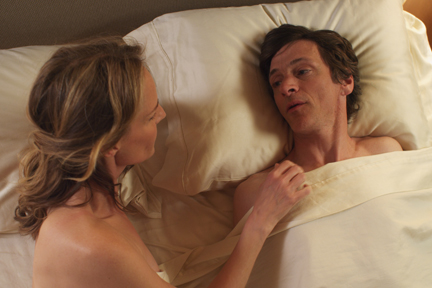The Sessions
Directed by Ben Lewin
Written by Ben Lewin
USA, 2012
Sometimes, all a movie needs to be even moderately successful is great acting. Though The Sessions (a big hit at this year’s Sundance Film Festival under its original name, The Surrogate) has a compelling nugget of a plot, what makes it powerful is the work from its leads, John Hawkes and Helen Hunt, and an able supporting cast. Hawkes, one of his generation’s finest character actors, delivers a career-best performance as Mark O’Brien, a paralyzed writer who decides, at age 38, it’s about time he had sex for the first time and gets in contact with a professional sex surrogate to help him achieve this goal.
Hawkes has shown in TV shows like Deadwood and movies like Winter’s Bone and Martha Marcy May Marlene that he has immense range as a performer. But it’s safe to say that you’ve never seen (or heard, thanks to an almost David Sedaris-like timbre) him like he is in The Sessions, playing a man who’s lived in an iron lung for almost his entire life, after contracting polio at a young age. Mark’s able to move his head, though he favors the right side over the left. He’s a poet and journalist who types via a well-placed pointer and typewriter, and balances out his inability to live without the help of frequent nurses and attendants with a fierce and indomitable spirit. But he realizes early on that he misses a more physical and intimate companionship, one he can’t find with any of his female attendants. After beginning work on an article about how the disabled handle the world of sex, Mark is encouraged by his priest (William H. Macy) and two of his attendants (W. Earl Brown and Moon Bloodgood) to meet with a sex surrogate (Hunt), who will walk him through his first time in multiple sessions.
Writer-director Ben Lewin shrewdly realizes that some movies work best when the director gets out of the way and lets the actors just act. Though The Sessions has more than a few loose threads in its writing, Lewin avoids any kind of unnecessary stylistic flourishes in telling Mark’s story. It’s not always worth praising a director for just pointing the camera at the action and shooting it, but Lewin’s matter-of-fact, cut-and-dried work is fitting for a film that’s in the more-than-capable hands of the people on the other side of the camera. Though most of the cast has extremely small roles (outside of Hawkes, Hunt, and Macy, few of the actors are onscreen for more than 5 minutes), they all make an impact in subtle yet distinct ways.
Brown and Bloodgood bring a down-to-earth, no-nonsense quality to their performances as Mark’s attendants. Though some of the dialogue they have when interacting with Mark about the trials and tribulations of sex in the modern world is familiar, both tackle it with aplomb. Adam Arkin, as Hunt’s gruff husband, is in the unfortunate spot of being the stick-in-the-mud character, reacting enviously as his wife grows closer emotionally to her client. Arkin’s character feels a bit undefined; it’s rare that a movie could be improved by being 10 minutes longer, but if Lewin was able to flesh out that role a bit more, it’d have been a welcome addition. Also of note is Robin Weigert in a pivotal third-act role; she’s typically solid in her few minutes on screen, but it’s even more pleasing for any Deadwood fans, as Hawkes—one of the show’s leads—gets to interact again with Weigert and Brown (also regulars on Deadwood) here, though all three aren’t ever in the same scene.
The Sessions’ only serious flaws come from Lewin’s script, which sometimes feels as if a few scenes have been deleted from the final version, causing a bit of confusion. Part of Mark’s growth comes from being less anxious around women, and from letting his Catholic guilt not be a burden as he attempts to lose his virginity. But some of the guilt centers on a past family trauma, which is only commented on and never given enough heft. And one of the recurring scenes—Hunt’s character going back to her home and commenting via audiotape what transpired at the session with Mark—causes a bit of frustration. We see Hunt talking about an in-depth, soulful conversation she had with Mark, as opposed to watching that conversation unfold. Hunt and Hawkes are so excellent in the film that hearing of more interactions, not seeing them, is an unnecessary tease.
The Sessions is, in its best moments, a sweet, lovely meditation on life and being courageous enough to live it, not letting it pass by. John Hawkes has—as hard as it may be to believe—never been better than he is in such a physically challenging and emotionally resonant role. And Helen Hunt matches him in an honest, charming, and relatable performance. Though the film as a whole may have some problems, The Sessions is home to two of the strongest performances in 2012.
— Josh Spiegel




